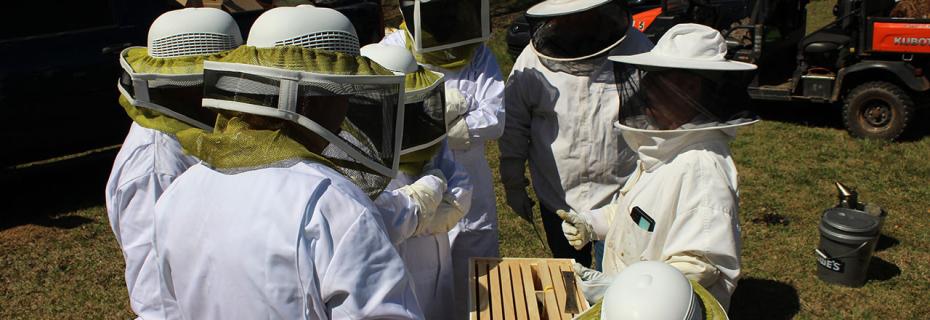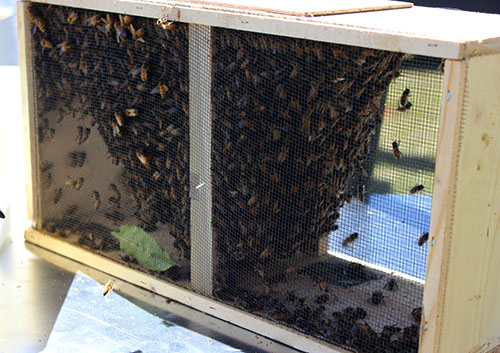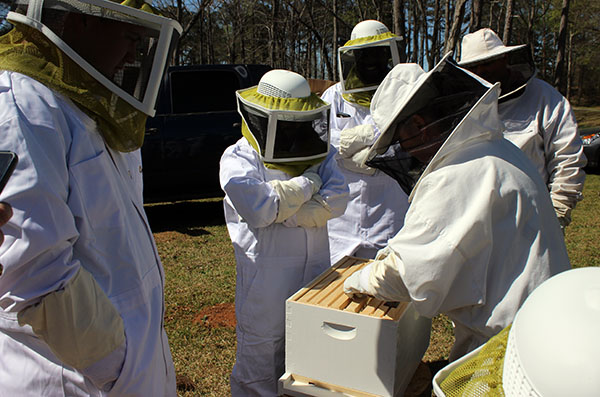About Us
Learn More
 The Official Web Site of the State of South Carolina
The Official Web Site of the State of South Carolina

The latest addition to the instructional program at the South Carolina Governor’s School for Agriculture at John de la Howe is creating quite a buzz around campus – or at least in one out-of-the-way corner of the farm.
In late March, beekeeper Susan Marie Jones, incoming president of the South Carolina Beekeepers Association, visited the McCormick County campus to assist students and teachers in placing six new beehives in a small field behind the main school building. These hives are now home to around 60,000 honey bees.
 “This is exciting because we are able to teach our young people, who are going to go out throughout the state of South Carolina,” Ms. Jones said after the new hives were placed. “In fact, the class that I had, the majority of them were seniors. So they are all going to leave de la Howe with beekeeping experience so that they can take it into their communities with beekeeping all across South Carolina.”
“This is exciting because we are able to teach our young people, who are going to go out throughout the state of South Carolina,” Ms. Jones said after the new hives were placed. “In fact, the class that I had, the majority of them were seniors. So they are all going to leave de la Howe with beekeeping experience so that they can take it into their communities with beekeeping all across South Carolina.”
On the Governor’s School campus, the participating student beekeepers are led by agriculture teacher Rodney Mann, who was joined by fellow faculty member Hunter Morton in the initial setup. Both donned the protective suits and helmet veils that all students will use when safely tending to the beehives.
“This is one of the most incredible experiences I’ve ever seen a group put together for a group of students,” Mr. Mann said. “Here at de la Howe, the students have been able to make this a practical, real-world project. We’re going to have some pretty sweet honey, but we’re going to have a pretty sweet learning experience at the same time.”
Mr. Mann’s agriculture classes prepared each wooden hive frame weeks before the bees arrived; they painted each box white, which will reflect spring and summer sunshine and help keep the bee colony cooler during the approaching warmer months. These students now will follow the bee colonies on every step of their journey from move-in to making honey to be sold next year under the de la Howe brand.
Kyle Gilreath was the first student at the Governor’s School to plant one of the bee colonies into a finished hive. The bees arrived in groups of about 10,000 inside mesh boxes equipped with large portals in their bases. Initially, Gilreath and his instructors placed a queen bee – who arrived in a tiny mesh box of her own – inside each hive. Then, the main package of bees was emptied, tumbling out of the box into the hive frame, their new home.
“It was fun,” Gilreath said. “It’s pretty easy, and it’s a good learning experience.”
As Gilreath followed each step of the setup carefully under Ms. Jones’ guidance, Mr. Mann stood nearby and watched with obvious pride.
“He’s much more comfortable with bees than I am, so it looks like he will fall right into it,” Mr. Mann said. “I think these students will do really well.”
 Now that the beehives are in place and active, the students and their teachers will regularly monitor the health of each queen and wait for the process of making marketable honey to take its slow, natural course. The bees will have 1,300 acres around the John de la Howe campus to forage for nectar from flowering plants; the typical range of a honey bee can be upwards of a mile or two from its hive.
Now that the beehives are in place and active, the students and their teachers will regularly monitor the health of each queen and wait for the process of making marketable honey to take its slow, natural course. The bees will have 1,300 acres around the John de la Howe campus to forage for nectar from flowering plants; the typical range of a honey bee can be upwards of a mile or two from its hive.
“They will collect nectar and produce honey this year,” Ms. Jones said, “but the majority of it will be used for energy to build wax and build out comb in these colonies. It takes about eight pounds of honey to create one pound of wax.”
The bees will expand their hives by storing collected wax to survive the upcoming winter, and “next year is when you’ll be able to reap the result of all of their hard work because their home is already built,” she said.
The addition of a beekeeping program at the South Carolina Governor’s School for Agriculture is much more than a buzzworthy educational experience; it is an investment in the future of sustainable agriculture in South Carolina.
“A good majority of the food that we eat is pollinated by pollinators,” said Ms. Jones, the first female president-elect of the state Beekeepers Association. “We have lots of natural pollinators here in the United States, but the benefit of honey bees is that there are thousands of honey bees in one colony. They’re able to be trucked to various fields to pollinate our crops on a much larger scale than the single, solitary pollinators that are native to the United States.”
For Mr. Mann and other farming professionals on the Governor’s School faculty, adding beekeeping to the curriculum is a natural extension of the school’s mission to train the future leaders of South Carolina’s robust agricultural economy.
“Here, we are all about teaching and educating and understanding what’s going on in agriculture,” Mr. Mann said. “There’s a big commercial honey bee business in South Carolina, and one of our focuses is that we get students ready for real careers, for things that are related to the real careers and crops and agriculture that we have here. This is a big part of that.”